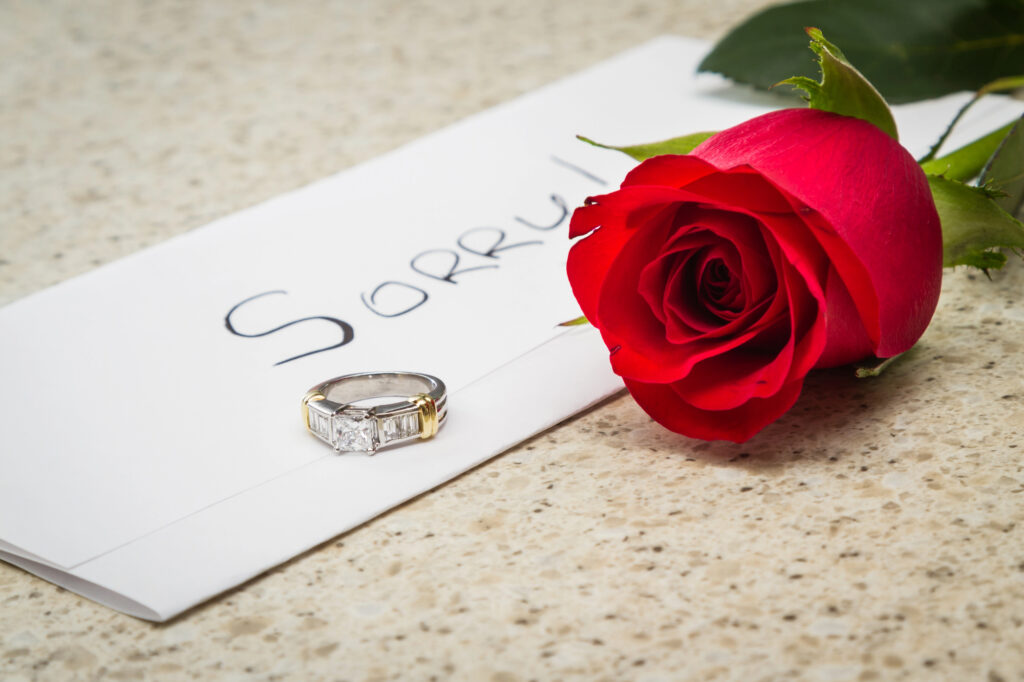Divorce isn’t just a legal process; it is an emotional one. A sincere apology can bridge the gap between conflict and closure by acknowledging each spouse’s contributions, easing tension, and unlocking stalled resolutions. An apology can shift the tone from adversarial to understanding, helping both parties move forward with greater peace and emotional healing.
Divorce is often seen as a businesslike process, dividing property, settling custody arrangements, and finalizing agreements. Yet, beneath the legal proceedings lies a deep emotional current. One of the most powerful but overlooked tools in going through the divorce process is the act of apology. While an apology may seem out of place in such a difficult context, it can help acknowledge needs, validate contributions, and unlock resolution. Here is how an apology can be an asset in divorce:
Acknowledging Needs and Contributions
At its core, an apology is about recognition. In divorce, this can mean acknowledging your partner’s role in the marriage, whether as a financial provider, a dedicated parent, or the one who held the family together at home. For many people, hearing their contributions recognized is just as important as dividing assets fairly. An apology can serve as a bridge, meeting a lingering emotional need that legal documents alone cannot satisfy.
Mediation and Collaborative Divorce: A Space for Apologies
In a litigated divorce, apologies rarely surface. Courtrooms are adversarial by nature, and opportunities for meaningful dialogue are scarce. By contrast, Mediation and Collaborative Divorce create space for open communication. In these settings, you and your spouse sit down together, and conversations unfold in a more human way. Here, apologies and acknowledgments can arise naturally. This often becomes a pivotal moment that changes the tone of the entire divorce process.
When an Apology Unlocks Resolution
There are cases where progress stalls, not because of financial disagreements, but because something deeper remains unresolved. For instance, one spouse may hesitate to sign final papers, not out of legal concerns, but because they are still wanting something more and that can be an apology. Once that simple, sincere acknowledgment is given, the logjam breaks, and resolution follows. Without it, even the most carefully crafted agreements may remain unfinished.
Transforming Conflict into Closure
Apologies do more than smooth negotiations. It can transform relationships. What begins as a tense, adversarial interaction can soften into understanding when acknowledging the other’s pain or contributions. This shift doesn’t mean reconciliation as spouses, but it does allow you to move forward without the weight of unspoken resentment. In many cases, an apology is the final step that allows both sides to truly let go and begin the next chapter of their lives.
Timing Is Everything
Apologies in divorce don’t follow a fixed script. Sometimes they happen at the beginning of the process, easing the way for constructive discussions. Other times, they come at the very end, offering closure before final signatures. Regardless of when it occurs, the impact can be profound, turning acrimony into acceptance and giving you both a path toward healing post-divorce.
The Law Offices of Patrick Markey, P.C., are located at 180 Stetson Avenue, Suite 3500 in Chicago, Illinois. You may call us at 312-223-1764.
Patrick Markey is a Chicago based attorney who is an advocate of no court divorce options. He believes Collaborative Divorce and Mediation create better outcomes to your divorce process.
Mr. Markey is a member of Super Lawyers, an elite group of the top 5% of top lawyers (https://www.superlawyers.com). He is also listed as a top divorce lawyer by AVVO (https://www.avvo.com) and is a fellow of Collaborative Divorce Illinois (https://collaborativedivorceillinois.org), as well as a member of The Chicago Bar Association (https://www.chicagobar.org)

